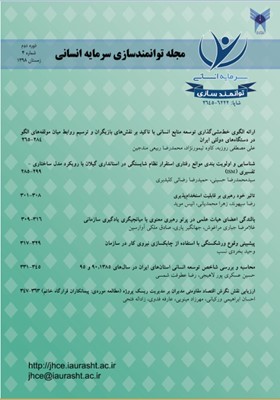تاثیر خود رهبری بر قابلیت استخدامپذیری
محورهای موضوعی : توانمندسازی سرمایه انسانیرضا سپهوند 1 , زهرا محمدیانی 2 * , انیس مؤید 3
1 - دانشگاه لرستان. خرم اباد. ایران
2 - دانشگاه لرستان خرم اباد ایران
3 - دانشگاه لرستان، خرم اباد، ایران
کلید واژه: خود رهبری, قابلیت استخدامپذیری, شرکت ارتباطات سیار ایران,
چکیده مقاله :
افزایش قابلیت استخدامی مهمترین عاملی است که افراد حرفهای بهدنبال آن بوده تا بتوانند به موقعیتهای شغلی مطلوب دست یافته و در مسیر پیشرفت و توسعه شغلی حرکت کنند. اخیرا در ادبیات مدیریت موضوعات جدیدی همچون خودرهبری طرح شدهاند که، افراد را در افزایش قابلیت استخدام یاری میکنند. هدف پژوهش حاضر بررسی اثر خودرهبری بر قابلیت استخدامپذیری است. روش پژوهش از نوع توصیفی_پیمایشی و از نظر هدف توسعهای و کاربردی است. جامعه آماری دانشجویان رشته مدیریت دانشگاه لرستان میباشند. روش نمونهگیری استفادهشده نمونهگیری دردسترس است. از آنجایی که حجم کلی 350 نفر است، حجم نمونه 183 نفر براساس فرمول کوکران بدست آمده است. برای جمعآوری اطلاعات از پرسشنامه استفاده شده است. برای تجزیه و تحلیل دادهها از تکنیک مدلسازی معادلات ساختاری با کمک نرمافزار smart-pls بهرهگرفته شده است. نتایج بهدستآمده نشان میدهد خودرهبری با ضریب مسیر 456/0 بر قابلیت استخدام تاثیر مثبت و معناداری دارد. با توجه به این یافتهها میتوان نتیجه گرفت خود رهبری بر قابلیت استخدام تاثیر مثبت و معناداری دارد.
Aim: Increasing employability is the most important factor that was followed by professionals so that they can get the job they want and move along the path of career development. Recently, management literature has addressed new issues such as self-management and career path orientation of proteins that help individuals to increase their employability. The purpose of the present study was to investigate the effect of self-leadership on employability with the mediating role of protean career orientation in Iranian mobile communications company. Methods: The research method is descriptive-survey and in terms of developmental and practical purpose. A questionnaire was used to collect data. Structural equation modeling technique with the help of PLS software was used to analyze the data.. Results: The results show that self-leadership has a positive and significant effect on employability both directly (path coefficient 0.689) and indirectly (path coefficient 0.354) through protean career orientation. Also, self-leadership (path coefficient 0.777) has a positive and significant effect on protean career orientation and protean career orientation (path coefficient 0.456) on employability.. Conclusion: based on these findings, it can be concluded that self-leadership on protean career orientation and employability has a positive and significant effect.
زاهدی، شمس السادات.، حسنپور، اکبر. (1388). بررسی تاثیر روابط استخدامی بر قابلیت استخدام کارکنان در سازمانهای دولتی. مجله فصلنامه مدیریت توسعه و تحول 2. 1-8.
زاهدی، سید محمد.، زکیزاده، سهیلا. (1393). ﺗﺄﺛﯿﺮ ﻗﺎﺑﻠﯿﺖ اﺳﺘﺨﺪام ﺑﺮ ﻣﻮﻓﻘﯿﺖ ﮐﺎرراﻫﻪ ﺷﻐﻠﯽ ﮐﺎرﮐﻨﺎن ﺷﺮﮐﺖ ﻣﻠﯽ ﭘﺨﺶ ﻓﺮآوردهﻫﺎی ﻧﻔﺘﯽ اﺳﺘﺎن ﻗﺰوﯾﻦ. فصلنامه مدیریت توسعه و تحول 17. 63-73.
شریعتی، مرضیه.، طالبنیا، قدرتالله.، رویایی، رمضانعلی. (1397). بررسی اثر میانجی خودرهبری بر ارتباط بین فراشناخت و رفتار تصمیمگیری حسابداران مدیریت. دو فصلنامه حسابداری ارزشی و رفتاری. سال سوم. شماره پنجم. 101-129.
عباسی رستمی، نجیبه. (1393). مروری بر نظریه خودرهبری )مفاهیم، راهبردها و عوامل مؤثر بر خودرهبری). فصلنامه توسعه. سال نهم. شماره 34. 123-140.
واعظی، مظفرالدین.، مزاری، ابراهیم.، خبراه، کبری.، مقدمزاده، علی.، شالباف، عذرا. (1394). تحلیل عاملی استـراتژیهای خـودرهبری و رابطه آنها با عملکرد تحصیلی دانشجویان(مورد: دانشجویان دانشکده علوم و ادبیات دانشگاه بیرجند). رویکردهای نوین آموزشی. سال دهم. شماره2. شماره پیاپی 22، 1-20.
Furtner, M. R., Hiller, L.N., Martini, M., Sachse, P. (2012). Self-leadership, motivation to lead, trans-formational leadership and superleadership: A key to organizational success in the 21st century. International Journal of Business and Management Tomorrow. 2(7), 1-8.
Hirschi, Andreas. Jaensch, Vanessa K. Herrmann, Anne. (2016). Protean career orientation, vocational identity, and self-efficacy: an empirical clarification of their relationship. European Journal of Work and Organizational Psychology, Volume 26, 2017 - Issue 2, Pages 208-220.
Houghton, J. D., & Jinkerson, D. L. (2007). Constructive thought strategies and job satisfaction: A preliminary examination. Journal of Business and Psychology, 22, 45-53.
Houghton, J. Bonham, T.W. Neck, Christopher P. Singh, Kusum. (2004). The Relationship between Self-Leadership and Personality: A Comparison of Hierarchical Factor Structures. Journal of Managerial Psychology 19(4):427-441. Doi: 10.1108/02683940410537963.
Houghton, J.D. Neck, C.P. (2002) "The revised self-leadership questionnaire: Testing a hierarchical factor structure for self-leadership", Journal of Managerial Psychology, 17(8): 672-691, Doi: 10.1108 /02683940210450484.
Jackson, Denise. Wilton, Nicholas. (2016). Perceived employability among undergraduates and the importance of career self-management, work experience and individual characteristics. Higher Education Research and Development, DOI: 10.1080/07294360.2016.1229270.
Messum, D., Wilkes, L. and Jackson, D. (2015) ‘What employability skills are required of new health managers?’, Asia Pacific Journal of Health Management, Vol. 10, No. 1, pp.28–35.
Saad, M.S.M. and Majid, I.A. (2014) ‘Employers’ perceptions of important employability skills required from Malaysian engineering and information and communication (ICT) graduates’, Global Journal of Engineering Education, Vol. 16, No. 3, pp.110–115.
Sarfraz, Isra. Hewege, Chandana Rathnasiri. Rajendran, Diana. (2018). An exploration of global employability skills: a systematic research review. Int. J. Work Organisation and Emotion, Vol. 9, No. 1, DOI: 10.1504/IJWOE.2018.10012435.
Worth, sean. (2003). Adaptability and Self-Management: A New Ethic of Employability for the Young Unemployed?. Journal of Social Policy, Volume 32, Issue 4, pp. 6-7-621.
Van der Heijde, C. M., & Van der Heijden, B.I.J.M. (2006). A competence Based and multidimentional operationalization and measurement of employability.HRM, 45(3), 449-476.
_||_
